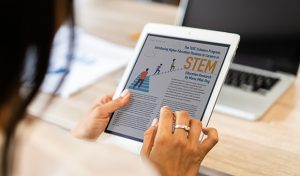


The impact of visual and auditory distractions on the performance of neurodiverse students in virtual reality (VR) environments
Explore the impact of ambient stimuli on cognitive tasks in virtual reality. Discover how VR can empower neurodivergent learners for better attention control. Insights and design recommendations revealed.

Using eye-tracking in education: review of empirical research and technology
A review of 68 studies reveals how eye-tracking and machine learning are used to study learning in youth across settings.

Broadening participation in STEM through equity-minded high-impact practices: a multimodal systematic review
This article examined 38 programs aiming to broaden participation in undergraduate STEM education using an equity-minded HIP framework. Explore the findings and discover essential recommendations for researchers and funders to implement equity-minded practices to broaden participation.

Empowering Latinx Families with Math
Empowering Latinx Families with Math

First Graders’ Definitions, Generalizations, and Justifications of Even and Odd Numbers
This study examines how first graders define even and odd numbers and justify generalizations about parity in early algebra.

“So, we kind of started from scratch, no pun intended”: What can students learn from designing games?
In the Building systems from Scratch program, designing a game about climate change requires students to carry out multiple learning tasks in parallel, that is, (1) applying systems thinking to climate change concepts; (2) understanding and applying game design principles, and (3) systematically mapping knowledge of a science topic into a game by programming and engaging in CT practices.

